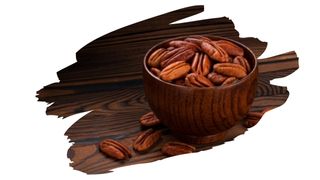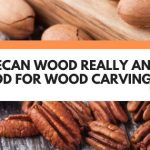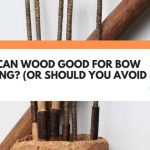Pecan wood is one of the hardest, toughest woods you can manually work with.
And that toughness is why this lumber is so sought-after.
Now, floors get put through a lot of every day wear and tear. So they need to be made from durable strong materials — at least if you want your floor to last for decades.
But, is Pecan wood really the best option for your homes hardwood flooring?
Well, in this post, you’ll learn which materials make for the most long-lasting floor. You will also find out which lumber is the most durable choice for a hardwood floor.
And keep reading to discover the top 3 pros and cons to Pecan wood.

This post may contain affiliate links to products that we receive a commission for (at no additional cost to you). Learn more here.
Which Type Of Flooring Lasts The Longest?
The toughest most hard-wearing floors are ceramic, or they’re made from porcelain.
These materials are scratch-resistant, and heat-resistant. And, most importantly for your floor, they are rot-resistant.
But wood, regardless of strength, is still a biodegradable material. And if moisture manages to get into wood fibers, wood will become soft enough for bacteria to eat it.
End result? Wood rot.
So, in terms of durability and decay-resistance, ceramic and porcelain floors are some of the most long-lived.
But What Is The Healthiest And Safest Type of Flooring For Homes?
Wholly natural materials are always going to be the safest option — if you want to avoid toxins.
This is why a natural solid wood floor is a great eco-friendly material choice for any home.
While certain manufactured woods, such as MDF, are among the worst options. Especially as it relates to your homes air-quality.
Related Post: Is MDF Safe When Painted (Without A Primer)?
Not only are some manufactured woods susceptible to irreparable water-damage, they also sometimes contain high levels of formaldehyde.
But Is Pecan Flooring Good Enough For A Durable Floor?
As one of the more affordable tough hardwoods, it is certainly strong enough to be.
Pecan wood (Carya illinoinensis) is a subspecies of Hickory (aka the Carya tree genus). And it is harder and tougher than Hard Maple, and even White Oak.
You see, one way we measure the strength of hardwood flooring material, is by looking at its Janka rating. The Janka rating measures how much force it takes to crush a piece of wood.
The more force it takes, the stronger the timber.
White Oak has a Janka rating of 1290 lbf. So that means it will take 1290 pounds of crushing force to scratch this timber. While Hard Maple, (also known as the Sugar Maple), has a Janka rating of 1450 lbf.
But, Pecan wood is way ahead of both of them, with a Janka rating of 1820 lbf.
What Are The Top 3 Pros Of Pecan Wood?
- 1). It is a very tough hardwood. It is more scratch resistant than White Oak.
- 2). It is perfect for Rustic decor interior design.
- 3). It is a natural, safe, and non-toxic material.
And Whats The Strongest Most Durable Hardwood Flooring?
Standing heads and shoulders above the rest, is the rare and expensive Ipe wood. Ipe wood is so dense, that it’s resistant to pretty much everything.
Ipe wood is so strong that it would take 3510 lbf to make even the slightest dent in this timber. On top of that, it’s high density also makes it difficult to burn. So it is fairly fire-resistant too.
It’s toughness also means that bugs have little chance of munching their way into it. So, you can add bug-resistance to its list of advantages.
And last, but not least, it is one of the most rot-resistant hardwoods you can hope to get. In fact, water droplets struggle to sink down into Ipe’s densely packed fibers.
Got It. So Is Pecan Flooring Just As Durable As Ipe?
The strength of wood is only one way to measure durability of a flooring material. Especially since tough materials don’t scratch (or snap) underfoot.
Nevertheless, when it comes to a natural material such as wood, you must also look at it’s susceptibility to rot.
Now, all solid natural wood will rot and decay away eventually. However, some wood types rot away much more slowly, thanks to their moisture-resistant characteristics.
For example, Teak wood and Rosewood contain a lot of natural oils that repel water. Acting like a natures own wood preservative, those oils help protect these timbers from decay.
Other wood types, such as White Oak, have quirky characteristics that stop moisture from entering their wood pores.
Related Post: Can You Really Use Untreated Oak For Raised Beds?
And, of course, Ipe is the titan of all hardwoods. Particularly as it can shrug off almost anything.
Yet, many other types of timber do not have any special qualities that can help to prevent rot. And, unfortunately, Pecan wood is one such timber.
What Is Pecan Engineered Hardwood Flooring? Pecan engineered hardwood is similar to plywood, in that it’s made up of multiple layers of plywood (at its core). However, the top visible layer of this material is a thin layer of Pecan wood.
But Why Does It Matter If Pecan Wood Is Not Rot-Resistant?
Wood rot is a real issue when it comes to hardwood flooring.
Crawl spaces under the floor, and sub-flooring, are the perfect areas for trapping humidity. And all of that trapped moisture-filled humidity can be a recipe for disaster for natural Pecan wood.
Related Post: What To Do About White Mould Under Your Hardwood Floorboards
And Pecan wood simply doesn’t have anything about it to help prevent decay — if moisture happens to get into it. In fact, not even the dense heartwood from the center of this tree can shrug off bugs or rot.
If you wrap Pecan with a quality sealant, the sealant should be able to do the heavy-lifting of repelling water. Nonetheless, if that seal is broken, and a bit of moisture slowly seeps in, this hardwood will fast-rot away.
What Are The Top 3 Cons Of Pecan Wood?
- 1). It is not rot-resistant. Even the toughest part of this tree, the heartwood, will succumb to munching insects.
- 2). It is a pricey lumber. While not the most rare timber, it is more expensive than most North American Hardwoods.
- 3). It is so tough that it is hard to machine and saw through. This can increase the chances of tear-outs as you work with this timber.
So Is Pecan Wood Good For Flooring?
Pecan hardwood floors look better than ceramic and porcelain floors. And its strength means that it can handle everyday wear and tear.
However, this assumes you only use this wood in very dry, low humidity areas. Otherwise, Pecan is a bad choice for areas frequently saturated with steam and water-spills (i.e. bathrooms, kitchens, laundry rooms, etc).
To Wrap Up, Here Are The 3 Key Takeaways From This Post…
- 1). The most durable material you can use for flooring is ceramic or porcelain. They are tough, and won’t fall prey to rot.
- 2). The most rot-resistant hardwood you can use for your floor is Ipe wood. This wood is so dense, it struggles to absorb water!
- 3). Pecan wood is very scratch-resistant, and is stronger than White Oak. However, Pecan wood is not rot-resistant.
References:
“The genomes of pecan and Chinese hickory provide insights into Carya evolution and nut nutrition.” | Huang, Youjun, et al. GigaScience 8.5 (2019): giz036.



